
(Up to OJB's Photo Intro Page) Conventional PhotographyI used conventional cameras for years before I started using digital extensively. The early digital cameras suffered from all sorts of problems and really just weren't a realistic alternative. I have always used Canon because there products are sophisticated and of good quality but also easy to use and not too expensive. I currently use a Canon EOS-5 camera with a 35-80 and 75-300 zoom lens and a Sunpak flash unit. In the past have had two Canon T-90s SLRs. These were one of the first advanced computer controlled cameras with multiple microprocessors, fast film advance, and many metering modes built-in. They used Canon FD lens so they weren't autofocus. Also both of them failed (one due to a slightly negligent action on my part). Before that I had a Canon A1 which was quite a nice camera but didn't have a built-in winder and lacked the advanced electronics of later cameras. My first real SLR camera was a Canon AL-1, which was a reasonable camera, but probably a bit lacking for a serious amateur. CamerasIn many ways the camera is the least important part of the process because it never really interacts with the light that makes the photo. The light travels through the lens, so that's really important, and focusses onto the film, so that's also important. All the camera does is hold everything in place and use the shutter to expose the film for the correct amount of time. On the other hand, the camera is where the photographer interacts with the photographic process so a good set of controls (or "user" interface using more computer oriented terminology) is important - that's where I think Canon gets it right - their controls are well designed. The camera also controls the other components so its important from that point of view as well. LensesA good lens, or set of lenses, is really important. Many people just use the general purpose lens that comes with the camera and miss out on all sorts of creative opportunities. Modern zoom lenses are remarkably good, thanks to the latest design of aspherical elements, so a zoom lens is probably best. The disadvantage of zooms is they tend to be slower than fixed focal length. This means that taking a photo of the same subject will require a longer exposure with the zoom, and often the lens is slower when zoomed to higher magnification than wide angle, futher complicating things. For example a 35-70 f/5.6 (quite common) will need twice the exposure time of a 50mm f/2.8 in the same situation. If you work a lot in low light this could be critical. FilmOne part of the equation of conventional photography which is often not given enough importance is the film. I have never established any particular brand of film as beng superior to anything else, but I generally use Fuji. I usually use print film but also do a bit of work with slides. Print film is generally more forgiving as far as getting the exposure right is concerned. Slower films usually give more detail and less grain but getting the right exposure is more important so I usually compromise by using 200 asa. I did some photos in a situation where there was plenty of light using 25 asa film and got some amazingly detailed prints back. Another problem not often considered is the processing of the film. Even the better film processers I have used have produced mixed results. Most aim at giving the fastest, cheapest service more than a quality product. I have my stuff processed overnight where conditions are often better than during the one hour process, but there's still no guarantees. At one point I had a professional photographer who could develop slides for me, and I even did some processing myself, but this usually isn't practical. Not having to rely on a film processer is another advantage of digital, of course. ![[Up]](../XuShared/Up4B.jpeg)
Comment on this page: Useful • OK • Useless or: View Results |
||||||||||||